Business professor profiles 25 inspiring female leaders
Jan-Benedict Steenkamp’s new book shows how these “gritty women” bent the arc of history.

A biography of Alexander the Great sparked Jan-Benedict Steenkamp’s interest in history’s greatest leaders when he was a kid, but it’s former British Prime Minister Margaret Thatcher who influenced his own leadership style.
“She succeeded where a long string of her predecessors, all male, did not,” says Steenkamp, Knox Massey Distinguished Professor of Marketing at UNC Kenan-Flagler Business School. He teaches the popular business course Leadership Lessons from History. “When she was told by those in her party that she needed to water down her views and tone down her language, she flat-out refused. She was decisive and unwavering as a leader. It was electrifying.”
Thatcher is one of 25 women across thousands of years of history profiled by Steenkamp in his soon-to-be-released book on leadership, “Warrior Queen Scientist Activist: Gritty Women Who Bent the Arc of History” (Xlibris, 2024).
His sixth book and his second on leadership lessons told using a historical perspective, “Warrior” follows “Time to Lead: Lessons for Today’s Leaders from Bold Decisions that Changed History.” His friend, UNC ancient and medieval history professor Fred Naiden, provided feedback on every chapter.
“Warrior” includes household names like Thatcher, Cleopatra, Joan of Arc and Queen Elizabeth I, but also those less well known, with legacies often overshadowed by their male counterparts.
There’s Zenobia, the third-century A.D. queen of the Roman province of Palmyra whose skill on the battlefield created an empire nearly as big as ancient Rome’s. There’s Virginia Hall, an American considered to be one of World War II’s most dangerous spies by the Gestapo, whose post-war career in the CIA was derailed by the machinations of male peers threatened by her success. There’s politically conservative Thatcher but also politically moderate Angela Merkel, former German chancellor. He includes Underground Railroad conductor Harriet Tubman and political activist Angela Davis, who fought for civil rights and equality in very different ways.
“These leaders had to be even tougher than the men because they had to first prove that as women, they could even be leaders in the first place. They began on an uneven playing field,” he says. “The women who succeeded made an impact that was even greater than that of men.”

Jan-Benedict Steenkamp. (UNC Kenan-Flagler)
The 25 women profiled come from a wide range of educational, cultural and ethnic backgrounds. To Steenkamp, what resonates is their boldness and charisma, their ability to gain lasting loyalty. Readers can learn more about their own mettle through an “Assessing Your Own Grit” test at the end of the book.
“I wanted to show the ubiquity of female leadership across different endeavors,” says Steenkamp. “There is a very important message of hope here as well: We can see that a woman doesn’t have to fit in a particular kind of behavior to succeed. She can do it alone or with others, just like male leaders. But she will need to have grit, as do men. That’s inspiring to me.”
Steenkamp is also inspired by the three most important women in his life. He dedicates the book to his mother, Constance Steenkamp; his wife, the renowned marketing scholar Valarie Zeithaml, and his daughter, Iris Steenkamp, a marketing professor at Bocconi University in Milan.
“They have all shaped me in different ways,” he says. “But especially through my mother, I learned that in every situation what’s paramount is being truthful to my values. Do not compromise on what you hold dear, even if it costs you. That is something that I’ve always tried to do, wherever I go and whenever I lead.”







